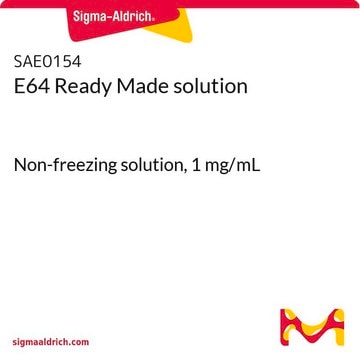Z720046
Millipore® Ziptips
C18, rack of 96
Sinónimos:
pipet tips, pipette tips
Iniciar sesiónpara Ver la Fijación de precios por contrato y de la organización
About This Item
Código UNSPSC:
41121500
NACRES:
NB.01
Productos recomendados
Materiales
colorless tip
esterilidad
non-sterile
Características
barrier: no
envase
rack of 96
fabricante / nombre comercial
Millipore ZTC18s960
intervalo de volumen
0.1-10 μL
¿Está buscando productos similares? Visita Guía de comparación de productos
Descripción general
Millipore ZipTips: Sample Preparation of Peptides or Proteins Prior to Electrospray/Nanoelectrospray MS
ZipTip Advantages:
Examples of analyses enhanced by ZipTip sample preparation:
The ZipTip is a 10 μL (P-10) pipette tip with a bed of chromatography media fixed at its end such that there is no dead volume. It is intended for purifying and concentrating femtomoles to picomoles of protein, peptide or oligonucleotide samples prior to analysis, providing better data quality. The sample is aspirated and dispensed through ZipTip to bind, wash, and elute. Recovered samples are contaminant-free and eluted in 0.5-4 μL for direct transfer to a mass spectrometer target or vial.
ZipTip C18 is a 10 μL pipette tip with approximately a 0.6 μL bed of chromatography media fixed at its end such that there is no dead volume. ZipTip Micro-C18 is a 10 μL pipette tip with approximately a 0.2 μL bed of chromatography media fixed at its end such that there is no dead volume. Both are ideal for concentrating and purifying peptides, proteins or oligonucleotides in seconds prior to mass spectrometry, HPLC, capillary electrophoresis and other analytical techniques.
ZipTip Advantages:
- Single-step desalting, concentration, and purification
- Fractionate complex samples for more meaningful data
- Ideal for peptides, proteins, nucleic acids, and more
- No dead volume for maximum recovery
- Eliminates time-consuming chromatography
Examples of analyses enhanced by ZipTip sample preparation:
- Mass spectrometry
- HPLC (high performance liquid chromatography)
- Capillary electrophoresis
- Atomic absorption spectroscopy
The ZipTip is a 10 μL (P-10) pipette tip with a bed of chromatography media fixed at its end such that there is no dead volume. It is intended for purifying and concentrating femtomoles to picomoles of protein, peptide or oligonucleotide samples prior to analysis, providing better data quality. The sample is aspirated and dispensed through ZipTip to bind, wash, and elute. Recovered samples are contaminant-free and eluted in 0.5-4 μL for direct transfer to a mass spectrometer target or vial.
ZipTip C18 is a 10 μL pipette tip with approximately a 0.6 μL bed of chromatography media fixed at its end such that there is no dead volume. ZipTip Micro-C18 is a 10 μL pipette tip with approximately a 0.2 μL bed of chromatography media fixed at its end such that there is no dead volume. Both are ideal for concentrating and purifying peptides, proteins or oligonucleotides in seconds prior to mass spectrometry, HPLC, capillary electrophoresis and other analytical techniques.
Información legal
Millipore is a registered trademark of Merck KGaA, Darmstadt, Germany
Elija entre una de las versiones más recientes:
Certificados de análisis (COA)
Lot/Batch Number
It looks like we've run into a problem, but you can still download Certificates of Analysis from our Documentos section.
Si necesita más asistencia, póngase en contacto con Atención al cliente
¿Ya tiene este producto?
Encuentre la documentación para los productos que ha comprado recientemente en la Biblioteca de documentos.
Dae-Hee Lee et al.
Autophagy, 14(11), 1870-1885 (2018-07-07)
Macroautophagy is induced under various stresses to remove cytotoxic materials, including misfolded proteins and their aggregates. These protein cargoes are collected by specific autophagic receptors such as SQSTM1/p62 (sequestosome 1) and delivered to phagophores for lysosomal degradation. To date, little
Arman Kulyyassov et al.
Biomolecules, 10(1) (2020-01-23)
Protein-protein interactions of core pluripotency transcription factors play an important role during cell reprogramming. Cell identity is controlled by a trio of transcription factors: Sox2, Oct4, and Nanog. Thus, methods that help to quantify protein-protein interactions may be useful for
Nuestro equipo de científicos tiene experiencia en todas las áreas de investigación: Ciencias de la vida, Ciencia de los materiales, Síntesis química, Cromatografía, Analítica y muchas otras.
Póngase en contacto con el Servicio técnico





